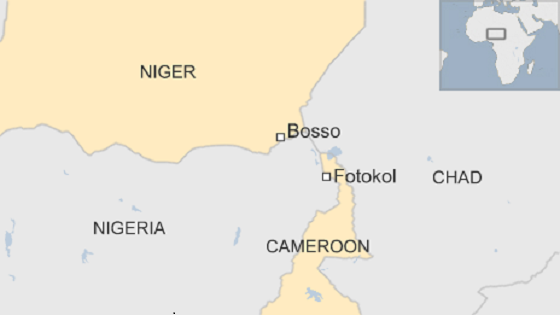Fierce battles between Boko Haram and a growing coalition of Nigeria’s neighboring states has left hundreds dead this week. Swarms of the group’s jihadists launched a series of attacks inside Niger on February 6, marking the first time that Boko Haram has penetrated into that country. The attacks, which reportedly left over 100 Boko Haram fighters dead, also injured a senior Chadian army general.
Details on the clashes were reported by the AFP:
Boko Haram launched its first major attack in Niger on Friday, triggering a forceful response from regional troops who claimed to have killed more than a hundred of the Islamists.
The clashes in Bosso and Diffa, along the border with Nigeria, marked yet another expansion of violence attributed to Boko Haram, but it seemed to have come at a heavy cost.
Niger’s defence minister reported that 109 of the Islamists were killed, along with four soldiers and a civilian. Seventeen other troops were wounded.
Chadian forces, who have taken a lead role in battling Boko Haram in recent days, fought alongside Niger’s troops on Friday. Chad’s commander in Niger, General Yaya Daoud, was also wounded with a gunshot to the stomach, a security source said.
Niger’s Defence Minister Mahamadou Karidjo said calm had been restored to both Bosso and Diffa.
Chadian forces have been stationed in Bosso since Monday, a humanitarian worker said, adding that Boko Haram “took the municipality” for a time before being “driven back to Nigeria”.
Other clashes broke out some 10 kilometres (six miles) from Niger’s Diffa, which is on the border with Nigeria near a bridge that links the two countries. Its control is essential for transporting troops and supplies.
Little more than a stream, the Komadougou Yobe marks the frontier between Niger and Nigeria, and the water level has recently dropped considerably, making it easy to cross.
Earlier this week, Boko Haram counterattacked Chadian forces staging in the strategic village of Fotokol located in Cameroon, killing at least 70 people and destroying many homes as well as the central mosque, according to the BBC.
Unnamed US intelligence officials estimated this week that Boko Haram has about 4,000-6,000 “hardcore” fighters. The Islamist force has long occupied large swathes of territory in northeastern Nigeria and over 1.5 million Nigerians have been displaced by the violence. On February 7, the Nigerian electoral commission announced it will postpone the presidential and legislative elections scheduled for February 14 for six weeks, allowing for more time to secure the volatile northeastern areas, according to the AFP.
Are you a dedicated reader of FDD's Long War Journal? Has our research benefitted you or your team over the years? Support our independent reporting and analysis today by considering a one-time or monthly donation. Thanks for reading! You can make a tax-deductible donation here.









3 Comments
The more cities they control, the larger their force will become through conscription ect. There defacto “capital” of Gwoza alone has several hundred thousand people.
Thankfully other nations have brought to bear enough force and fire power to put these animals in their rightfull place, either six feet under or the nearest ditch,whichever is easiest!! One has to ask why did it take a multinational force to do what Nigeria should have been at least trying to do? I understand that the regular Nigerian soldier comes from a substandard educational background which inhibits his abilities in the field, but their officers and N.C.O.s should at least be able to do rudimentary battlefield maneuvers. And at least motivate their underling’s to show some bravado?
It is this kind of nonsensical wars and killings that paint Africa as a dark continent. while other continents are developing we are busy destroying what we have achieved for more than 50 years then blame the western press for our own failures. Now look at where African safari is heading to due to such wars like Boko Haram and Al-shabab that has crippled Kenya safari industry